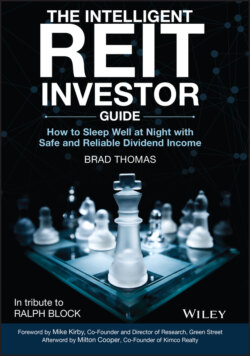Читать книгу The Intelligent REIT Investor Guide - Brad Thomas - Страница 18
High Current Returns Versus Slow Growth
ОглавлениеMany people understandably wonder if those high dividends have a negative effect on REITs’ growth prospects. After all, their 90% pretax‐income payouts mean they can only keep so much money to build on.
Stock prices do indeed appreciate from rising earnings growth. Therefore, REIT shares do usually rise at a slower pace than non‐dividend‐paying companies. However, this is perfectly acceptable to their investors, who expect to make up much – or even all – of the difference through higher dividend payments over time.
Consider the study presented in the January/February 2003 issue of Financial Analysts Journal. Entitled “Surprise! Higher Dividends = Higher Earnings Growth,” it was written by hedge fund manager Cliff Asness of AQR Capital Management and academic Robert Arnott of Research Affiliates. Together, they concluded that the earnings growth rates of companies with above‐average dividend payments are actually higher than those with lower offerings.
These results tend to defy logic, I know. But the latter kind of company doesn't always do a good job of reinvesting its retained capital. Why should it? There's not the same incentive to be careful in this regard.
Regardless, REITs do have other means of obtaining growth (yet another to‐be‐discussed topic, this time in Chapter 10). They can make additional stock and debt offerings, exchange new shares or partnership units for properties, or get creative with buying and selling strategies.
With all that said, when dealing with most subsectors, it's often best to have relatively conservative expectations. In most cases, investors would be wise not to expect more than mid‐single‐digit growth over the long term. And when those conservative expectations are blown out of the sky, you'll want to do your due diligence.
It's not an automatic warning flag when a REIT's stock just keeps climbing. Some sectors perform better than others at varying times, which only makes sense. Real estate is a cyclical industry, so there will be down years. But rental rates do grow over time, meaning that healthy REITs’ cash flows will grow as well.
These assets don't promise instant riches or even perpetual investment tranquility. But the sector does make for excellent long‐term investments nonetheless. I've seen it happen too many times for myself and my readers to doubt that fact.
